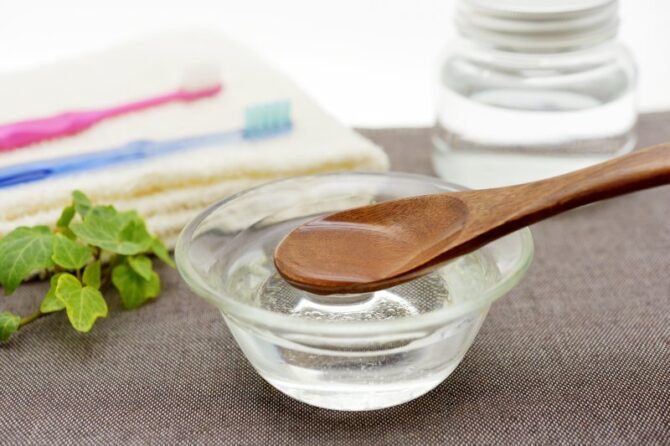
Home remedies for gum disease
7 natural treatments
Think you can’t treat gum disease at home? You’re not alone. A lot of people think that only a professional can help them when it comes to fixing gum issues. You can try a few at-home remedies before heading to the dentist. These treatments are natural, affordable, and effective, from hydrogen peroxide and saltwater rinses to essential oils and tea tree oil mouthwash. Plus, most of them are easy to do!
In this blog post, we will explore “home remedies for gum disease.” Stay tuned for more tips on keeping your mouth healthy!
Oil pulling
Oil pulling is a popular home remedy that can help prevent gum disease and bleeding gums. It is said to kill bacteria and stimulate saliva production. It is generally practiced in the morning and involves swishing a tablespoon of oil around the mouth for around 20 minutes. Once the oil has become milky and thin, it should be spat out. There is evidence that oil pulling can inhibit plaque formation so it may be just as effective as a mouthwash.
Oil pulling is best done once or a few times weekly, but not more than three times daily. Begin with a five-minute session, and gradually increase the duration of the treatment to 20 minutes. The practice should never replace the proper oral hygiene routine, such as brushing, flossing, and routine dental cleanings.
Another oil-pulling home remedy is tea tree oil. This essential oil has potent antifungal and antibacterial properties. It can be safely added to a tablespoon of coconut oil before you begin pulling. It can also help fight infections by penetrating oral mucous. However, some people may experience a gag reflex when trying this method. To avoid this, you should blow your nose a few times before you start oil pulling.
Green tea
Gum disease is a condition in which plaque, the buildup of bacteria, toxins, and food compounds, accumulates on the teeth. This plaque triggers the immune system to launch an inflammatory response, which is why the gums become inflamed and bleeding. Over time, this inflammation can lead to tooth loss and bone deterioration.

Green tea contains powerful antioxidants, which are beneficial for gum health. These compounds work to neutralize the inflammatory response of the immune system to the bacteria that cause gum disease. This helps prevent further damage to the gums and supporting jawbone. Green tea also contains hydrogen peroxide, a mild antiseptic that can relieve minor mouth irritations and kill bacteria that contribute to gum disease. You can purchase a solution of hydrogen peroxide in 3% concentration or mix it with 50 percent water to create a stronger, more effective tea.
Drinking green tea regularly can significantly boost dental health. A recommended daily intake is five cups per day. However, it is crucial to prepare the tea properly. It is best to avoid adding sweeteners, as this will negate the beneficial effects. Also, avoid drinking too much green tea at once.
Cloves
You may not have heard of cloves as a home remedy for gum disease, but the fruit and its oil effectively against the bacteria that cause the disease. Because of their antibacterial properties, cloves are included in many natural oral care products. Applying clove oil to your gums can relieve pain and has remineralizing effects. It can also prevent gum disease from advancing to more serious stages. Clove oil is applied to the gum and surrounding tissues during a toothache to relieve the pain. The clove oil will numb the area, but dilute it with carrier oil first. The numbing effects will last for only a few minutes.
Clove oil is used as a mouthwash, as well. Dilute it with olive oil or other neutral carrier oil. Apply the mixture to the affected area and sit for a few minutes. The clove oil should leave a warm sensation, and you should also be able to taste a strong gunpowder-like flavor. Repeat the process every two to three hours to maintain the effect.
Epsom salt
If you’ve been suffering from gum disease, you may have heard of the Epsom salt home remedy. Using it on your gums will reduce the swelling and ease the discomfort. It also contains antibacterial and anti-inflammatory properties. This natural treatment can also kill bacteria that cause pain and restore the pH balance in the mouth.
The Epsom salt’s name comes from the saline springs in Surrey, England. It is a mineral compound containing magnesium and sulfate. It was originally derived from mineral water, but nowadays, it is primarily obtained through mining operations. It has the chemical formula MgSO4, consisting of small, colorless crystals. The salt is similar to table salt, which is made of sodium chloride.
Cranberry
Cranberry juice is another good remedy. It contains an ingredient called tannic acid, which is very effective for fighting bacteria. By gargling with this solution, you can reduce the number of harmful bacteria in your mouth and gums. To promote gum health, you can also apply cranberry juice to the affected areas. These home remedies can be a natural alternative to costly dental treatments. It is not only delicious but is also effective in preventing the spread of the infection.

Cranberry has antibacterial and anti-inflammatory properties and may be used as a home remedy for gum disease. It contains vitamin C and antioxidants and should be consumed in its pure form. It can also be applied to the gums to treat bleeding, swelling, and pain. Alternatively, you can mix it with baking soda and use it as toothpaste.
In addition to the antibacterial properties of cranberry juice, cranberry also contains Coenzyme Q10, a powerful antioxidant that improves tissue oxygenation. It has also been shown to reduce receding gum lines, making it an excellent gum disease home remedy. In addition to cranberry juice, you can consume foods high in vitamin C, such as oranges, strawberries, guava, and papaya. These foods are also great for gum health and can relieve pain and inflammation associated with periodontal disease.
Things to avoid if you have gum disease
Brushing too hard
You should use gentle circular motions when you brush your teeth. Brushing too hard can irritate your gums and make your gum disease worse.
Flossing incorrectly
You should floss gently between each tooth, using a back-and-forth motion. Flossing too hard or using the wrong technique can irritate your gums.
Eating sugary foods
Sugar feeds the bacteria that cause gum disease. To help prevent gum disease, avoid sugary foods and drinks as much as possible.
Smoking
Smoking is a major risk factor for gum disease. If you smoke, quitting is the best thing you can do for your oral health.
Not visiting the dentist regularly
You should see your dentist at least once a year for a professional cleaning and checkup. Regular dental visits can help to prevent gum disease and catch any problems early.
Poor oral hygiene
Good oral hygiene habits are essential for preventing gum disease. Be sure to brush twice a day, floss daily, and use mouthwash to keep your mouth clean and healthy.
Stress
Stress can make it harder for your body to fight off infection, leading to gum disease. To help prevent gum disease, manage stress with relaxation techniques such as yoga or meditation.
What are the best home remedies for gum disease?
While there is no one “best” home remedy for gum disease, there are several effective treatments that can help improve your oral health. These include brushing and flossing regularly, using an antibacterial mouthwash, and avoiding tobacco products. Additionally, your dentist may recommend specific treatments depending on the severity of your gum disease.
How can I prevent gum disease?
The best way to prevent gum disease is to practice good oral hygiene. This includes brushing and flossing regularly and visiting your dentist for regular checkups and cleanings. Additionally, you should avoid tobacco products, which can contribute to the development of gum disease.
What are the symptoms of gum disease?
Common gum disease symptoms include bleeding gums, receding gums, and bad breath. Additionally, you may experience pain when chewing or sensitivity to hot or cold temperatures. If you experience any of these symptoms, it is important to visit your dentist so that they can determine the cause and provide appropriate treatment.
Can gum disease be reversed?
In some cases, gum disease can be reversed with proper oral care. However, if the condition has progressed to advanced stages, it may require more aggressive treatment, such as surgery. Therefore, it is important to visit your dentist regularly so that they can monitor your oral health and provide the appropriate treatment, if necessary.
You can do a few things at home to help treat gum disease and keep your smile healthy. First, brush your teeth twice a day and floss regularly. This will remove plaque from your teeth and gums, which can help reduce inflammation. You can also try rinsing with an antibacterial mouthwash to kill bacteria and promote healing. Additionally, eat a balanced diet and avoid tobacco products, which can contribute to gum disease. Finally, see your dentist regularly for professional cleanings and checkups. Following these tips can effectively treat gum disease and keep your smile looking its best.
